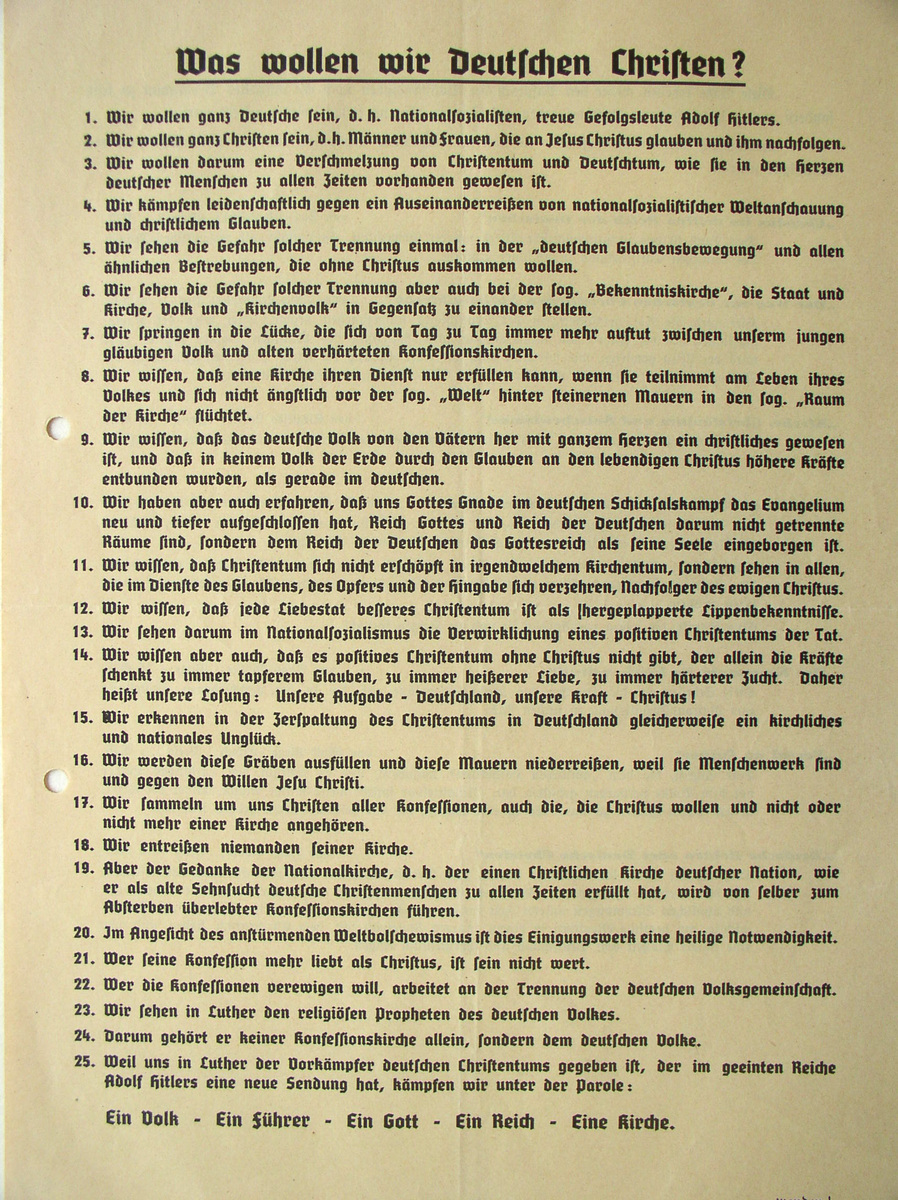Source
1. We want to be Germans through and through, that is, National Socialists, loyal followers of Adolf Hitler.
2. We want to be Christians through and through, that is, men and women who believe in Jesus Christ and follow him.
3. We therefore want a fusion of Christianity and Germanness as it has existed in the hearts of German people at all times.
4. We struggle passionately against the tearing apart of National Socialist Weltanschauung and Christian faith.
5. We see the danger of such a division, first: in the “German faith movement” and all similar endeavors that seek to get by without Christ.
6. But we also see the danger of such a division in the so-called “Confessing Church,” which sets up as opposites the state and the church, the people and the “people of the church.”
7. We leap into the gulf that is opening ever wider day by day between our young people of faith and the old, hardened confessional churches.
8. We know that a church can perform its service only if it participates in the life of its people and does not seek refuge, fearfully, from the so-called “world” behind walls of stone and in the so-called “sphere of the church.”
9. We know that the German people was, from the time of its fathers, wholeheartedly a Christian people, and that in no people of the earth were greater powers unleashed by faith in the living Christ than in the German people.
10. But we also experienced that in this fateful German struggle the Grace of God revealed the Gospel to us anew and more profoundly, that the Kingdom of God and the Reich of the Germans are therefore not separate spheres, but that the Kingdom of God is enshrined within the Reich of the Germans as its soul.
11. We know that Christianity is not exhausted in any particular church, but we see followers of the eternal Christ in all who wear themselves out in service to faith, sacrifice, and devotion.
12. We know that every act of love is better Christianity than words that pay mere lip service.
13. We therefore see in National Socialism the realization of a positive Christianity of deeds.
14. But we also know that a positive Christianity does not exist without Christ, who alone bestows the power for an ever more courageous faith, an ever more ardent love, an ever-tougher discipline. That is why our motto is: Our task – Germany, our force – Christ!
15. We see in the fragmentation of Christianity in Germany in equal measure an ecclesiastical and a national misfortune.
16. We will fill these trenches and tear down these walls, because they are the work of man and contrary to the will of Jesus Christ.
17. We are gathering around us Christians of all denominations, including also those who desire Christ and who do not or no longer belong to a church.
18. We will not tear anyone away from his church.
19. But the idea of the National Church, that is, the one Christian Church of the German Nation, which filled German Christians as an ancient yearning at all times, will lead by itself to the extinction of obsolete confessional churches.
20. In the face of the onslaught of world Bolshevism, this work of unification is a sacred necessity.
21. Anyone who loves his confession more than he loves Christ is not worthy of him.
22. Anyone who seeks to perpetuate the denominations is working on dividing the German national community.
23. We see in Luther the religious prophet of the German people.
24. That is why he does not belong to any confessional church, but to the German people.
24. Because Luther was given to us as the champion of German Christianity, who has a new mission in the united Reich of Adolf Hitler, we are fighting under the motto:
One people – One Führer – One God – One Reich – One church.
Source: Flugschrift mit einem Bekenntnis zum Nationalsozialismus. Produced by Deutsche Christen. Leipzig, c. 1938. Deutsches Historisches Museum, Berlin, Inv.-Nr.: Do 90/3369
